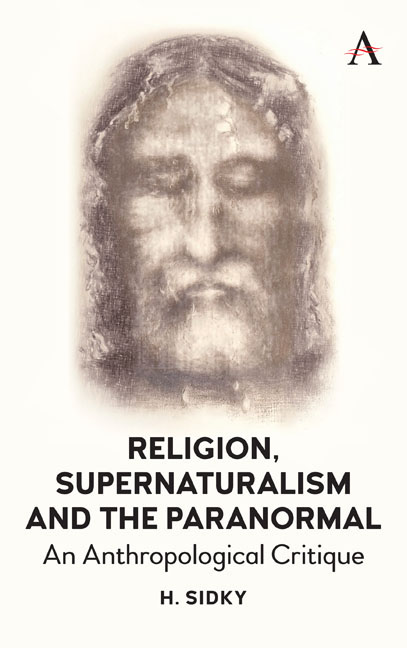Book contents
- Frontmatter
- Dedication
- Contents
- Acknowledgments
- Introduction
- Chapter One The Problem with Religion: Preliminary Issues
- Chapter Two The Unreal Real: The Supernatural, Religion, and the Paranormal
- Chapter Three Can Science Say Anything About Religion and the Supernatural?
- Chapter Four Ghostly Rappings, the Science of the Soul, and the Religious Nature of the Paranormal
- Chapter Five Ghostly Encounters in the Field: Anthropology of the Paranormal or Paranormal Anthropology?
- Chapter Six Why We Think the World Is Haunted
- Chapter Seven Cognitive Biases and Why People Think Eerie Thoughts
- Chapter Eight Miracles as Evidence of God's Actions in the World
- Chapter Nine When God Talks to People: Are Religious Experience Evidence of God?
- Chapter Ten Books Authored by God? Sacred Texts as Evidence of the Supernatural
- Chapter Eleven God's Fingerprints in the Natural World: Intelligent Design, Irreducible Complexity, and Cosmic Fine-Tuning
- Chapter Twelve The Miracles of the Bible: The Quintessential Foundations of Paranormal Beliefs in Western Culture
- Chapter Thirteen Jesus the Miracle Worker, Magician, and Sorcerer
- Chapter Fourteen Jesus's Empty Tomb, Missing Body, and Return from The Dead: Sources for the Paranormal Tale
- Chapter Fifteen The Post-Resurrection Appearances in the New Testament
- Chapter Sixteen Coping with Failed Prophesy: A Socio-Psychological Explanation for the Rise of Christianity
- Chapter Seventeen Conclusions: Why Religious and Paranormal Beliefs Persist and Their Dangers
- References
- Index
Chapter Seventeen - Conclusions: Why Religious and Paranormal Beliefs Persist and Their Dangers
Published online by Cambridge University Press: 16 December 2019
- Frontmatter
- Dedication
- Contents
- Acknowledgments
- Introduction
- Chapter One The Problem with Religion: Preliminary Issues
- Chapter Two The Unreal Real: The Supernatural, Religion, and the Paranormal
- Chapter Three Can Science Say Anything About Religion and the Supernatural?
- Chapter Four Ghostly Rappings, the Science of the Soul, and the Religious Nature of the Paranormal
- Chapter Five Ghostly Encounters in the Field: Anthropology of the Paranormal or Paranormal Anthropology?
- Chapter Six Why We Think the World Is Haunted
- Chapter Seven Cognitive Biases and Why People Think Eerie Thoughts
- Chapter Eight Miracles as Evidence of God's Actions in the World
- Chapter Nine When God Talks to People: Are Religious Experience Evidence of God?
- Chapter Ten Books Authored by God? Sacred Texts as Evidence of the Supernatural
- Chapter Eleven God's Fingerprints in the Natural World: Intelligent Design, Irreducible Complexity, and Cosmic Fine-Tuning
- Chapter Twelve The Miracles of the Bible: The Quintessential Foundations of Paranormal Beliefs in Western Culture
- Chapter Thirteen Jesus the Miracle Worker, Magician, and Sorcerer
- Chapter Fourteen Jesus's Empty Tomb, Missing Body, and Return from The Dead: Sources for the Paranormal Tale
- Chapter Fifteen The Post-Resurrection Appearances in the New Testament
- Chapter Sixteen Coping with Failed Prophesy: A Socio-Psychological Explanation for the Rise of Christianity
- Chapter Seventeen Conclusions: Why Religious and Paranormal Beliefs Persist and Their Dangers
- References
- Index
Summary
As long as people believe in absurdities, they will continue to commit atrocities.
— Voltaire, Questions sur les miracles (1765)Baloney, bamboozles, careless thinking, flimflam, and wishes disguised as facts are not restricted to parlor magic and ambiguous advice on matters of the heart. Unfortunately, they ripple through mainstream political, social, religious, and economic issues in every nation.
— Carl Sagan, The Demon-Haunted World (1995)The simple fact of the matter is that every religious belief in every culture in the world is demonstrably untrue. Regardless of whether the religious practices are organized communally or ecclesiastically, regardless of whether they are mediated by shamans or priests, regardless of whether the intent is manipulative or supplicative … all such practices are founded upon nonfalsifiable or falsified beliefs concerning the paranormal.
— James Lett, Science, Religion, and Anthropology (1997)Most rational people reject supernatural claims by the founders of recently developed religions, sects, and cults such as Mormonism, the Christian Science Church, Scientology, Peoples Temple, Order of the Solar Temple, and Heavens Gate because details about how those belief systems originated are well-known. These religions, like all others, also claim supernatural origins, cosmic significance, as well as espousing mysteries and miracles. However, the deceitful character and motives of the creators of these dogmas are wellknown. For this reason, aside from the indoctrinated, few others will accept their supernatural truth claims and cosmic significance. Yet, the assertions and tenets of these recently created religions are no different and no less implausible than those associated with the older, established faiths. These also claim celestial significance and promote beliefs in divine appearances, talking fiery bushes, seas parting, people transmuted into globs of salt, serpents that hold conversations and engage in conspiracies, global deluges, angelic visitations, virgin births, the dead coming back to life, and other miraculous and supernatural happenings.
Why are these beliefs not treated with skepticism in the same way as Scientology, Mormonism, and the others mentioned? A significant reason is that these religions have been around for thousands of years and no contemporary eyewitnesses were present when they were formulated (Coyne 2015: 83).
- Type
- Chapter
- Information
- Religion, Supernaturalism, the Paranormal and PseudoscienceAn Anthropological Critique, pp. 425 - 430Publisher: Anthem PressPrint publication year: 2019



